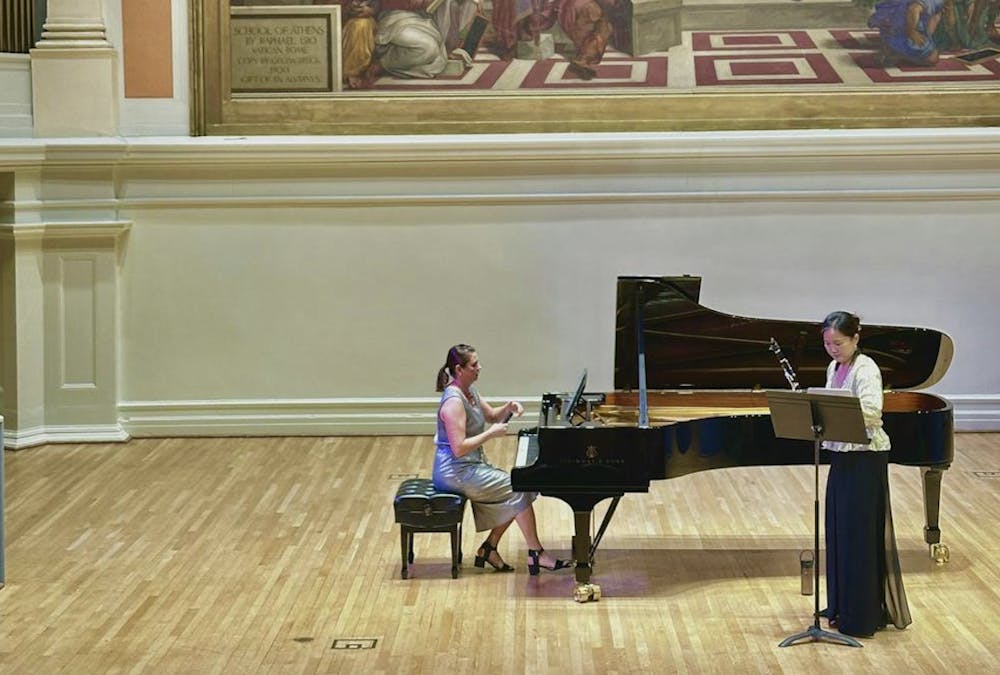It was a quiet Sunday afternoon, as the audience patiently waited in Old Cabell Hall for the second of the Department of Music’s Chamber Music Series. These concerts highlight faculty and guest musicians playing a wide variety of instruments. This edition starred Dr. Jiyeon Choi, the senior clarinet lecturer at the University and the principal clarinetist at the Charlottesville Symphony.
Spanning five pieces and a little over an hour, and also including accompanying performances on piano and violin, Choi’s concert drew from a diverse range of genres and time periods, including both classical and contemporary works. This was intentional on Choi’s part, as she wanted to widen the audience’s perspective on music.
“I just want everyone to be open-minded … to new music,” Choi said.
The first piece, “Ariaria” by Korean composer Jiyoun Chung, was released just two years ago. The work is divided into three distinct movements, each utilizing the clarinet to mimic a traditional Korean instrument or musical technique. This included “Pansori,” a style of singing, the “Haegeum,” a stringed instrument, and the “Daegeum,” a bamboo flute. With a melancholic tone throughout, Chung created this piece as a way to grieve for victims of anti-Asian violence.
“Ariaria” allowed Choi to showcase styles of playing not often seen in music for the clarinet. Fourth-year College student Henry Allen was impressed by the way she was able to mimic instruments from non-Western musical styles.
“It’s always unique when someone’s able to bring a non-Western timbre into a Western instrument,” Allen said. “You can definitely hear bits and pieces from other instruments — it wasn’t just a clarinet on that stage.”
Choi continued in the realm of contemporary music with “Spirit” by Shulamit Ran. Written in 2018, the piece honors Ran’s late friend and clarinetist Laura Flax, who had passed the year prior. The work is melodically loose and utilizes the full range of the clarinet. “Spirit” allowed Choi to display her masterful control of the clarinet, showcasing her acrobatic agility and powerful sound.
Her next three pieces marked a departure from the contemporary style and mournful tone of the previous two. The third piece, “Little Suite of Four Dances” by William Bolcom, was written in 1984 as a tribute to the father of the composer’s close friend Conrad Josias. “Little Suite of Four Dances” is a much more playful tune, drawing from classic American styles such as ragtime.
Notably, this was also the only piece in which she played on the Eb clarinet, which is smaller and higher-pitched than the usual Bb clarinet. The instrument is less often seen and is considered harder to play. Fourth-year College student Tillie Reagler, who also takes lessons with Dr. Choi, spoke on watching her play.
“I was really excited to see her play the E flat clarinet,” Reagler said. ”Watching what you can do with a smaller version of the clarinet was kinda crazy and cool.”
After a brief intermission, Dr. Choi returned with “Drei Romanzen, Op. 94” by Robert Schumann, the most overtly classical piece in the program. Written as a Christmas gift for Schumann’s wife, Clara, Dr. Choi perfectly expressed the emotional passion and romance of the piece. Reagler spoke about Dr. Choi’s connection to Schumann’s works.
“She really likes Schumann, I think she studied him at some point in her career,” Reagler said. “She talks a lot about the tonality and dynamics he incorporates into his works … so watching her do what she’s taught me to do was super interesting.”
For her last piece, “Suite for Violin, Clarinet, and Piano, Op. 157b” by Darius Milhaud, Dr. Choi invited Shelby Sender on piano and Daniel Sender on violin, both faculty at the University.
The music is adapted from the play “Le Voyageur sans bagage” by Jean Anouilh, which is about a World War I veteran who must reckon with his lost memories. Much like the overall program, the piece was varied in its musical styles, flipping between somber passages and lively dances. First-year College student Parker Walls noted how the three musicians played in perfect synchronicity.
“I really liked how they incorporated three instruments and … how the melodies played off of each other,” Walls said. “I really liked how the piano and clarinet harmonized, it was almost difficult to differentiate between two tones of the instruments, and it made it sound like one.”
Overall, Dr. Choi’s chamber concert presented a rich tapestry of global music, illustrating the unique possibilities that the clarinet has to offer. She also gave space for people to think about those close to them, both living and dead, through her thoughtful selection and rich playing. With her concert, she demonstrated a unique ear for music that others might not be aware of, which Allen mentioned.
“She always delivers when it comes to broadening your musical horizons,” Allen said.







